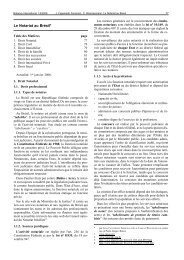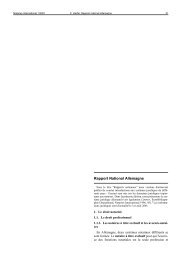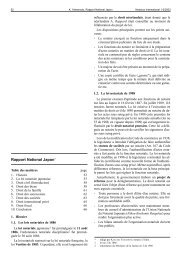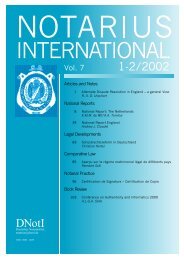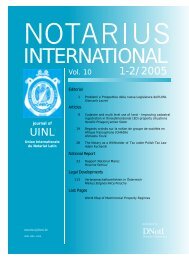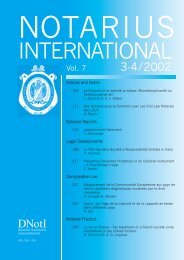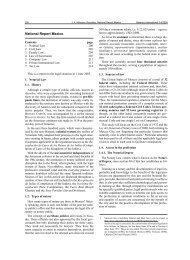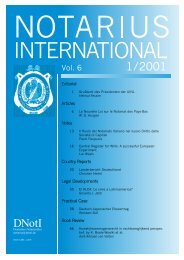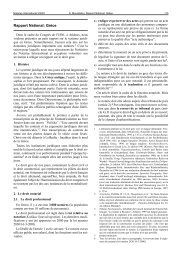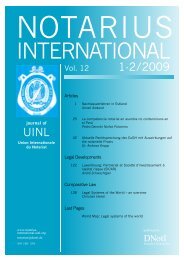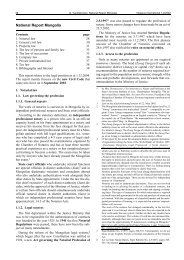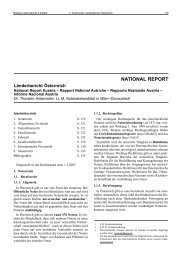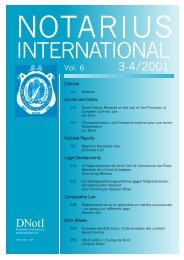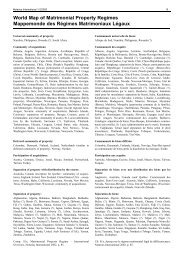Create successful ePaper yourself
Turn your PDF publications into a flip-book with our unique Google optimized e-Paper software.
<strong>Notarius</strong> <strong>International</strong> 3-4/<strong>2005</strong> E. Brancós Núñez, The Right of Withdrawal and Function of the Notary 279<br />
It must be concluded, in any event, that the right of<br />
withdrawal is not a panacea for the lack of consent that<br />
results from imperfect information or misinterpretation<br />
of the outcome of a commitment. A right of withdrawal<br />
that is afforded for a week or two gives the consumer<br />
much less protection than that derived from well-established<br />
general rules of contract and furthered by us, the<br />
notaries, in our provision of information, advice and assistance<br />
and in our establishing of consent and monitoring<br />
of legality.<br />
A right of withdrawal that is available for a short period<br />
of time does not protect the consumer. It just allows<br />
the supplier to draw a veil over any problems that there<br />
might be with its commitment. It enables the supplier to<br />
put the following argument to the consumer: you were<br />
told, you did not withdraw and now it’s your problem.<br />
The notary’s traditional dominance of real estate matters<br />
certainly makes the right of withdrawal a rarity here.<br />
People do not buy real estate in the same way that they<br />
might buy books, for example: by post without prior inspection.<br />
What is more, the mere fact of going to see a<br />
notary, of having a meeting with him and of calmly talking<br />
about a purchase precludes any idea of action being<br />
taken without due consideration.<br />
2. Identification of the subject of a right of withdrawal<br />
2.1 Consumer relationship<br />
The right of withdrawal is normally legislated upon in<br />
the context of a consumer relationship. This takes the<br />
form of a relationship in which a supplier acts in the<br />
course of its business but a private individual does not act<br />
in a business capacity (Germany, Austria, Spain, France,<br />
the Netherlands…). Some countries have also tried to establish<br />
an objective concept of consumer action but it is<br />
ultimately the parties and their activities that define this<br />
notion.<br />
2.2 Types of contract concerned<br />
Despite a few countries (Spain and Austria) laying<br />
claim to a catalogue of consumer rights, the right of<br />
withdrawal is not an established general right in all contracts<br />
concluded with a consumer; a right of withdrawal<br />
is only provided for in certain contracts.<br />
Specifically:<br />
- in Austria: hire purchase contracts, contracts relating<br />
to residential property renovation services, contracts<br />
governing the acquisition of a right of use, a right of exploitation<br />
or ownership of an apartment, a single family<br />
dwelling or real estate intended for the construction<br />
of a single family residence, holiday contracts, contracts<br />
for the use of immovable property, the law on the<br />
supervision of securities, the law on insurance policies,<br />
contracts concluded with dating agencies, joint venture<br />
agreements and certain aspects of the capital market.<br />
- in Estonia: doorstep selling, contracts concluded by<br />
means of communication, contracts for the temporary<br />
use of buildings, consumer credit and insurance policies.<br />
- in France: commercial leasing agreements, contracts<br />
of employment and for literary and artistic property,<br />
correspondence courses, sale of goods on credit, life assurance<br />
policies, marriage bureaus, contracts of sale for<br />
immovable property, timeshare agreements.<br />
- in Germany: distance selling, some forms of e-commerce,<br />
doorstep selling, life assurance, consumer credit,<br />
marriage bureaus, correspondence courses, mortgages<br />
and security investments.<br />
- in the Netherlands: distance selling contracts, timesharing,<br />
door-to-door sales, preliminary contracts for<br />
the sale and/or construction of dwellings.<br />
- in Spain: sales transacted off commercial premises,<br />
distance selling, timeshare agreements, the sale of immovable<br />
property on instalment credit terms, consumer<br />
credit and package holidays.<br />
2.3 Right of withdrawal in conjunction with consumer<br />
deeds<br />
There is nothing to prevent a kind of protection also being<br />
established in conjunction with a consumer deed. For<br />
example: the rules on standard-form contract clauses may<br />
also be of relevance in relationships between businesspersons,<br />
one of whom is a major contractor using<br />
contracts on a massive scale. The other party may or may<br />
not be a consumer; he might also be the head of another<br />
business. Normally, however, the rules on standard-form<br />
contract clauses are to be considered in the context of the<br />
whole system of consumer protection.<br />
Rights of withdrawal are also to be found in relationships<br />
that are not consumer relationships. In Spain, for<br />
example, the right or option of withdrawal is an exceptional<br />
one where contracts are concluded between private<br />
individuals. It is provided for in the case of powers of attorney<br />
(Article 1732 CC), in the case of deposit agreements<br />
– at least in certain situations (Article 1776 CC)<br />
and in the case of joint venture agreements (Article 1594<br />
CC). But these are always exceptional cases.<br />
A remedy fairly similar to the right of withdrawal is to<br />
be found in the Commercial Code. Its Articles 327 and<br />
328 govern sales on a trial basis or on approval, where<br />
it is provided that: “… the purchaser reserves the right to<br />
examine the goods and freely to cancel the contract if<br />
they should not suit him”. This form of redress differs<br />
from a right of renunciation in several ways. For example:<br />
it applies only at retail level; rejection may follow<br />
only from the objective condition or functioning of the<br />
item and not from contractual terms and conditions; it is<br />
customary to consider a sale incomplete until such time<br />
as the purchaser has examined the goods and formed the<br />
intention to acquire them (pending which, the risk of loss<br />
in the event of fortuitous circumstances or force majeure<br />
lies with the vendor – a point that is not made particularly<br />
clear in the case of a right of renunciation).<br />
The situation in France is also worth mentioning. The<br />
law of 23 December 2000 creates a right of withdrawal or<br />
cooling-off period for the benefit of a non-commercial<br />
purchaser of residential property. The law also adds an<br />
undertaking in relation to the sale of land within a development.



